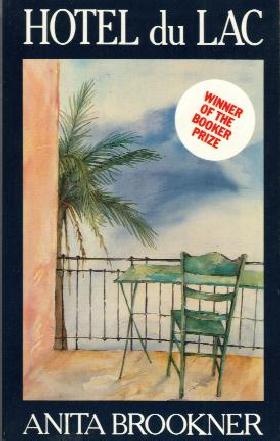
Anita Bookner
The following novels constitute the shortlist for the 1984 Booker Prize:
Notable Omissions from the 1984 Shortlist

|
Hotel du Lac Anita Bookner |
Quotes:
"This year the book does honour to the prize, as well as the other way round...It is a
smashing love story. It is very romantic. It is also humorous, witty, touching,
and formidably clever. Well done the judges." - The Times
"It is hard to convey the great qualities of this novel...she has produced a classic, a book
that will be read with pleasure a hundred years from now" - The Spectator
"There can be little doubt that she is one of the great writers of contemporary fiction" -
Literary Review
"Hotel du Lac is written with a beautiful grave formality, and it catches at the heart" -
The Observer
"The pointed observations, the precise visual details which bring these guests to live
are a joy" - Daily Telegraph
"This is a remarkable novel...Anita Bookner's best novel so far" - Sunday Times
First Paragraph:
From the window all that could be seen was a receding area of grey. It was to be supposed that beyond the grey garden, which seemed to sprout nothing but the stiffish leaves of some infamiliar plant, lay the vast grey lake, spreading like an anaesthetic towards the invisible further shore, and beyond that, in imagination only, yet verified by the brochure, the peak of the Dent d'Oche, on which snow might already be slightly and silently falling. For it was late September, out of season; the tourists had gone, the rates were reduced, and there were few inducements for visitors in this small town at the water's edge, whose inhabitants, uncommunicative to begin with, were frequently rendered taciturn by the dense cloud that descended for days at a time and then vanished without warning to reveal a new landscape, full of colour and incident: boats skimming on the lake, passengers at the landing stage, an open air market, the outline of the gaunt remians of a thirteenth-century castle, seams of white on the far mountains, and on the cheerful uplands to the south a rising backdrop of apple trees, the fruit sparkling with emblematic significance. For this was a land of prudently harvested plenty, a land which had conquered human accidents, leaving only the weather distressingly beyond control.
From the Triad Grafton paperback edition, 1984.
Notes:
In 1986 this novel was adapted for BBC television by Christopher Hampton, directed by Giles Foster and
featuring Anna Massey as Edith Hope, with Denholm Elliot, Googie Withers and Patricia Hodge.
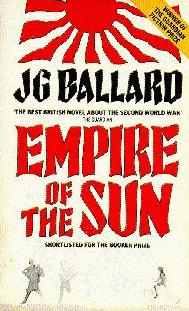
|
Empire of the Sun J.G. Ballard |
Dustjacket synopsis:
"In Empire of the Sun JG Ballard has produced a mesmerizing, hypnotically compelling
novel of war, of starvation and survival, of internment camps and death marches, which blends
searing honesty with an almost hallucinatory vision of a world thrown utterly out of joint. It
is a novel which shatters the myths of the Second World War in Asia - and which immediately
takes its place as a classic work of modern literature. Rooted as it is in the author's own
disturbing experience of war in our time, it is one of that small and select group of novels
by which the Twentieth Century will be not only remembered but judged."
Quotes:
"The best British novel about the Second World War" - The Guardian
"One of the most enthralling novels of the year...edge-of-the seat..wonderfully
well-written..a brilliant novel" - Daily Mail
"A book of quite astonishing authority and power, one of the very best novels of recent
years. I was excited, moved and impressed by it" - Paul Bailey, The Standard
"I think I have never read a novel which gave me a stringer sense of the blind helplessness
of war...it is haunting in its pictures, and its atmosphere is unforgettable" - Anthony Thwaite,
The Observer
"Searing...a brilliant fusion of history, autobiography and the kind of imaginative
speculation of which Ballard is an acknowledged master. An incredible literary achievement
and almost intolerably moving" - Anthony Burgess
"An extraordinary achievement" - Angela Carter
First Paragraph:
Wars came early to Shanghai, overtaking each other like the tides that raced up the Yangtze and returned to this gaudy city all the coffins cast adrift from the funeral pires of the Chinese Bund.
Jim had begun to dream of wars. At night the same silent films seemed to flicker against the wall of his bedroom in Amberst Avenue, and transformed his sleeping mind into a deserted newsreel theatre. During the winter of 1941 everyone in Shanghai was showing war films. Fragments of his dreams followed Jim around the city; in the foyers of department stores and hotels the images of Dunkirk and Tobruk, Barbarossa and the Rape of Nanking sprang loose from his crowded head.
From the Granada paperback edition, 1985.
Notes:
This novel was the winner of the Guardian Fiction Prize for 1984.
In 1987 a film adaptation of the novel was produced from a screenplay by Tom Stoppard. The film was directed
by Stephen Spielberg and featured Christian Bale, John Malkovich, Miranda Richardson and Nigel Havers.

|
Flaubert's Parrot Julian Barnes |
Quotes:
"Flaubert's Parrot is a massive lumber room of detail about the great man: in it
we learn an enormous amount about his life, family, lovers, thought processes, health
and obsessions. But the voice that tells us all this is gradually revealed to be itself
in the grip of an obsession. The voice is that of Geoffrey Brathwaite, a retired doctor with
a nagging need to rationalise his wife's suicide, and a more obscure compulsion to anatomise the
processes of human identity.
"Julian Barnes' success seems assured with this stunning combination of French provincial
wisdom and totured British self-analysis. The insinuating Barnesian style, weaving
feathers of disparate fact into a parrot's plumage of riches and a croak of human anguish,
should stop a few people in their tracks." - Books and Bookmen
"Julian Barnes' wry and graceful book, part novel, part stealthy literary criticism, traces
the marks Flaubert made on a forgetting world. The writing is unfailingly sharp and very
often funny, and among the best prose I have read in years." - The Sunday Times
"Rich in parody and parrotry, using Flaubert's words and free associations from them to write
biography in subversive form, this book is a great success, humane and generous, full of insight
and wit, rich and even prodigal in its verbal inventiveness: a book Flaubert would have scorned
to write, a book well worth writing." - New York Times Book Review
"Here is a novel designed by a dissident novelist in his refusal to conform. He sparkles and
speculates about life, death, love, morality, sex, writing and a hundred matters. Quite
wonderful." - The Spectator
"Flaubert's Parrot is an extraordinarily artful mix of tomfoolery and high seriousness.
It works as literary detection, literary criticism and lieterary experiment. In an age which
insists that every problem has an economic, political or technological solution, Barnes has
the courage and good humour to remind us that there are questions to which there are no answers." -
TLS
"An intricate and delightful novel" - Graham Greene
"A delight...Handsomely the best novel published in England in 1984." - John Fowles
First Paragraph:
Six North Africans were playing boule beneath Flaubert's statue. Clean cracks sounded over the grumble of jammed traffic. With a final, ironic caress from the fingertips, a brown hand dispatched a silver globe. It landed, hopped heavily, and curved in a slow scatter of hard dust. The thrower remained a stylish, temporary statue: knees not quite unbent, and the right hand ecstatically spread. I noticed a furled white shirt, a bare forearm and a blob on the back of a wrist. Not a watch, as I first thought, or a tattoo, but a coloured transfer: the face of a political sage much admired in the desert.
From the Picador paperback edition, 1985.
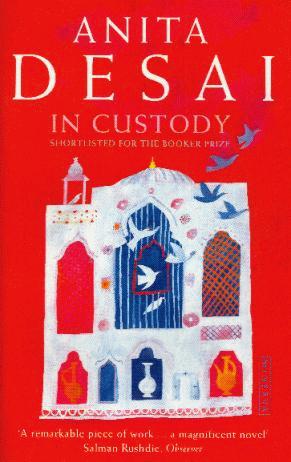
|
In Custody Anita Desai |
Dustjacket synopsis:
"When Deven is asked to interview India's greatest Urdu port, Nur, he sees an opportunity
to escape the miseries of his life as a frustrated small-town scholar. But Deven's hope for
fame and fulfilment soon turn to disaster. The dissolute old man he finds deep in the
bazaars of Old Delhi bears no resemblance to the idol of his youth, and as Deven is fooled,
cheated and bullied by Nur and the people who surround him, the whole project seems
destined to end in a new kind of captivity."
Quotes:
"A major attempt to tackle serious themes...In Custody is extraordinarily rich in
incident and detail...highly skilful" - Sebastian Faulks
"A memorable book. The best that Anita Desai has written" - Paul Bailey, Evening Standard
"In Custody is Anita Desai's most subtle and mature work to date...She retains an unforced and
powerful ease in conveying the colour and sounds and sensations of Indian life" - Times Literary Supplement
"A wry, gently humorous novel, full of wisdom and restraint...The author chronicles India
lovingly but it would be a mistake to think of her simply as an indian writer, for her
themes are universal" - Financial Times
First Paragraph:
His first feeling on turning around at the tap on his shoulder while he was buying cigarettes at the college canteen and seeing his old friend Murad was one of joy so that he gasped 'Murad? You?' and the cigarettes fell from his hand in amazement, but this rapidly turned to anxiety when Murad gave a laugh, showing the betel-stained teeth beneath the small bristling moustache he still wore on his upper lip. 'But I have a class just now, Murad,' he stammered as Murad squeezed his shoulders tightly as if he did not intend to let go.
From the Minerva paperback edition, 1997.
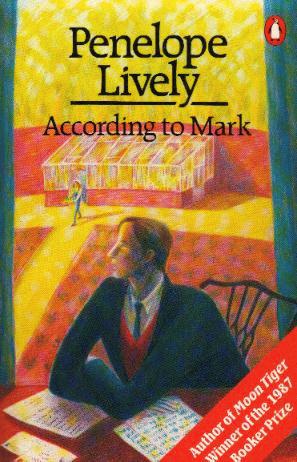
|
According to Mark Penelope Lively |
Dustjacket synopsis:
"Mark Lamming leaves London for Dorset one spring morning, unaware that he is leaving
his safe and manageable present behind...
"A respected literary biographer, Mark is working on the life of Gilbert Strong - a writer about whom he thinks he knows everything. A happily married man, dedicated to a life of letters, he nevertheless manages to fall in love with Strong's granddaughter, and vague and unsophisicated young woman more interested in bedding plants and alpines than books or passion. As the summer of Mark's obsessions steams along, he begins to understand that nothing is ever exactly what it seems - certainly not Gilbert Strong. And certainly not himself."
Quotes:
"A major talent" - London Review of Books
"Vivid, acute...funny and always readable" - Financial Times
"No one is better at setting up the airs and presumptions of their characters like skittles
and disposing of them neatly and unmaliciously" - Guardian
First Paragraph:
Mark Lamming, driving from London to Dorset to visit a young woman he had not met, thought about her grandfather. Gilbert Strong he had not met either but he knew as much about him as it is possible to know about a man twenty-three years dead: his opinions, his tastes, the texture of his beard, his whereabouts on particular days of particular years, his use of the semi-colon, his pet-name for his mistress. Folded into the driving-seat of the Fiat (brought principally for the use of his wife Diana and inappropriate for his long legs) Mark passed from city to the linked suburbias of Surrey and eventually into emptier and profounder landscapes in which despite himself and rather to his irritation he began to think of Hardy. Hardy simply arose from the hills and villages and inhabited the car, also with eerie familiarity: hat, stick, heard, wives, works. Mark, aware and vaguely resentful of some kind of conditioniong, pulled into a garage as a distraction, filled up the car and consulted the map once more. There were only four miles to go. He felt, now, unsettled and somewhat apprehensive. He did not consider himself as confident as other people thought him to be.
From the Penguin paperback edition, 1985.
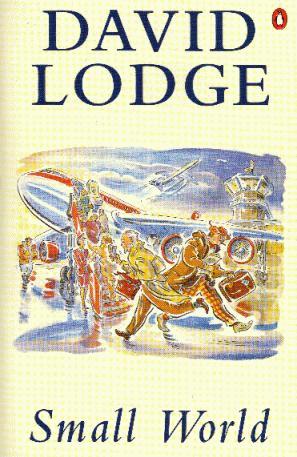
|
Small World David Lodge |
Dustjacket synopsis:
"Philip Swallow, Morris Zapp, Persse McGarrigle, the lovely Angelica - the jet-propelled
academics are on the move, in the air, on the make in Small World."
Quotes:
"Sex, romance, thrills, burlesque, satire, farce...most enjoyable" - Daily Mail
"Academic infightings, couplings touchy, funny and frightful, set pieces, dark humour, sharp
wit and plain farce - here is everything one expects from this author but thricefold and
three times as entertaining as anything he has written before" - Sunday Telegraph
"A wonderful tissue of outrageous coincidences, teasing elevations of suspense and delayed
climaxes" - Anthony Thwaite, Observer
"Ingenious and proliferate plotting...a new comic débâcle over every page" - The Times
"The most brilliant and also funniest novel that he has written" - Frank Kermode, London Review of Books
First Paragraph:
"April is the cruellest month," Persse McGarrigle quoted silently to himself, gazing through grimy windowpanes at the unseasonable snow crusting the lawns and flowerbeds of the Rummidge campus. He had recently completed a Master's dissertation on the poetry of T.S. Eliot, but the opening words of The Waste Land might, with equal probability, have been passing through the heads of any one of the fifty-odd men and women, of varying ages, who sat or slumped in raked rows of seats in the same lecture-room. For they were all well acquainted with that poem, being University Teachers of English Language and Literature, gathered together here, in the English Midlands, for their annual conference, and few of them were enjoying themselves.
From the Penguin paperback edition, 1985.
Notable Omissions from the Shortlist:
"Money", Martin Amis
"The Wasp Factory", Iain Banks
"Nights at the Circus", Angela Carter
"Kruger's Alp", Christopher Hope
"Nation of Fools", Balraj Khanna
"The Camomile Lawn", Mary Wesley
This page and its contents are copyright © 2002 by Perry Middlemiss, Melbourne, Victoria, Australia.
Last modified: April 16, 2002.